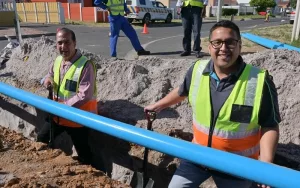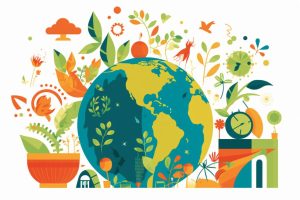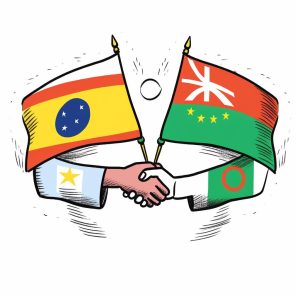South Africa’s Minister Sindisiwe Chikunga recently presented an inspiring welcoming address at the HighLevel Meeting on the Implementation of the Jeddah Amendment to the Djibouti Code of Conduct (DCoC) in Cape Town. The event, held in October 2023, gathered distinguished attendees, including notable maritime specialists and officials. Minister Chikunga’s address emphasized the continuous efforts to guarantee safety and security throughout the Western Indian Ocean and Gulf of Aden and underscored the importance of sustainable economic growth and regional collaboration.
Unlocking the Future: Athlone’s Pioneering R863.6 Million Water Overhaul Sets New Standards in Sustainability and Reliability
Athlone is revamping its water infrastructure by replacing outdated water mains with new uPVC pipes as part of its yearly pipe replacement program. The project aims to provide a reliable water supply in the long term and has allocated a significant amount of funds for water and sewer pipe replacement programs. Upgrades to the pipes in the Bridgetown suburb involve replacing outdated, fibre cement water mains with new 110mm diameter pipes that conform to compliance standards set by the South African Bureau of Standards. The initiative showcases the city’s commitment to sustainable development and the wellbeing of its citizens.
South African President Cyril Ramaphosa recently attended the World of Work Summit in Geneva, Switzerland. The event, hosted by the International Labour Organisation (ILO) on the sidelines of the International Labour Conference (ILC), focused on achieving “Social Justice for All.”
The world is currently facing unprecedented challenges, and leaders across the globe must rise to the occasion and collaborate for the common good of humanity. During the recent World of Work Summit of the International Labour Organization (ILO) in Geneva, Switzerland, South African President Cyril Ramaphosa highlighted the importance of collaboration in addressing these challenges, particularly in the pursuit of social justice.
South Africa’s Employment and Labour Minister, Thulas Nxesi, has called on the international community to accelerate progress towards achieving the Sustainable Development Goals (SDGs) by 2030. Speaking at the 111th Session of the International Labour Conference (ILC) in Geneva, Switzerland, Nxesi emphasized the need for a coordinated and collaborative approach to promoting social justice and tackling global challenges such as economic inequality, poverty, and discrimination.
In a recent address to the 111th Session of the International Labour Conference (ILC) in Geneva, Switzerland, South Africa’s Employment and Labour Minister Thulas Nxesi emphasized the need for accelerated global policy coordination and joint action. With only seven years to achieve the Sustainable Development Goals (SDG) 2030 targets, Nxesi stressed the important role of the International Labour Organization (ILO) members in facilitating dialogues and enhancing policy coherence.
Minister Mmamoloko Kubayi, the Minister of Human Settlements, addressed highlevel representatives from BRICS nations at the United Nations Office in Nairobi. The Minister emphasized the importance of urban resilience for sustainable urban development. This article summarizes her discourse and the key takeaways from the meeting.
On June 1st, 2023, the BRICS Ministers of Foreign Affairs and International Relations gathered in Cape Town, South Africa to discuss a range of political, economic, and social issues. The theme of the meeting was “BRICS and Africa: Partnership for Mutually Accelerated Growth, Sustainable Development, and Inclusive Multilateralism.” The ministers emphasized the importance of solidarity, openness, and consensus in shaping global policies.
As National Environmental Month begins in South Africa, Cape Town assumes a leadership role in sustainable development and environmental initiatives. With its stunning landscapes and diverse ecosystems, Cape Town is an exemplar of a city that prioritizes ecological preservation. In this article, we explore the key sustainability initiatives that position Cape Town as a beacon of environmental consciousness.
Biodiversity and Climate Change: A Threat to Humanity Biodiversity loss and climate change are critical concerns that threaten the existence of humanity. Urgent action is required to safeguard ecosystems and the millions of species that rely on them.
The North West Human Settlements Investment and Alternative Building Technology Summit 2023 is an upcoming event that aims to address the housing challenges faced by the North West province. This summit will bring together stakeholders from various fields to find innovative solutions that can drive sustainable development and improve the living conditions of residents in the region.
On 19th May, President Cyril Ramaphosa led the District Development Model Presidential Imbizo in the Cape Winelands District Municipality, Western Cape. The Imbizo aimed to promote collaboration and open communication between citizens, community organizations, businesses, and the government for inclusive economic growth.
On May 19, 2023, Minister Barbara Creecy and Deputy Minister Makhotso Sotyu will hold a media briefing ahead of the Department of Forestry, Fisheries, and the Environment’s (DFFE) Budget Vote. The event is a critical platform for the ministry to outline its priorities for the 2023/2024 financial year, with a particular focus on forestry, fisheries, and the environment.
Minister Gwede Mantashe delivered the Mineral Resources and Energy Department’s comprehensive Budget Vote Speech, outlining the achievements and strategies for South Africa’s mining and energy sectors amidst various global and domestic challenges. ### Focus Areas
South Africa and Colombia recently celebrated a significant milestone in their longstanding relationship during an official visit by Colombian Vice President Francia Elena Márquez. Deputy President Paul Mashatile of South Africa hosted a media briefing after the meeting, which took place at the Sefako Makgatho Presidential Guesthouse in Pretoria. The two countries are aiming to strengthen their political and economic ties while acknowledging their shared colonial legacies and the vast diversity of people, culture, and ecology in both nations.
The BRICS nations, comprising Brazil, Russia, India, China, and South Africa, have made significant progress in recent years. However, with the rapidly evolving geopolitical landscape, it is crucial for these countries to demonstrate unity, solidarity, and camaraderie. The Second Employment Working Group (EWG) meeting concluded with Thobile Lamati, DirectorGeneral of the Department of Employment and Labour, emphasizing the need for member states to leverage their collective power in multilateral forums to advance common interests and protect their positions.
















